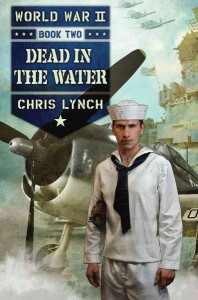 A fearsome force, Susan McCallum is determined, ruthless, and in-charge, but she’s only ten years old and a girl—ineligible for military service during the World War II era. When the brothers she idolizes, Hank and Theo, decide to serve their country in the navy, Susan is beyond angry. Their typically stoic, Scottish father, who fears that he may lose both sons, forbids that they serve in the same branch of the military. So, Theo joins the Army Air Corps, and the two brothers—the best defensive in-fielders in the game of baseball in Accokeek, Maryland—vow to play catch across the world, one aboard an aircraft carrier in the dauntingly difficult Pacific Theater of Operations, the other flying missions in the European Theater. Despite introducing three characters, Dead in the Water by Chris Lynch tells Hank’s story.
A fearsome force, Susan McCallum is determined, ruthless, and in-charge, but she’s only ten years old and a girl—ineligible for military service during the World War II era. When the brothers she idolizes, Hank and Theo, decide to serve their country in the navy, Susan is beyond angry. Their typically stoic, Scottish father, who fears that he may lose both sons, forbids that they serve in the same branch of the military. So, Theo joins the Army Air Corps, and the two brothers—the best defensive in-fielders in the game of baseball in Accokeek, Maryland—vow to play catch across the world, one aboard an aircraft carrier in the dauntingly difficult Pacific Theater of Operations, the other flying missions in the European Theater. Despite introducing three characters, Dead in the Water by Chris Lynch tells Hank’s story.
Pre-Pearl Harbor and beyond, serving aboard an aircraft carrier, Hank visits islands that didn’t exist in the geography books in the schools of Accockeek. Comparable to a bat-boy on a baseball team, Hank is an airdale on the flight deck, a loyal seadog readying F4F Wildcats for combat air patrol. Danger-driven, the fighter pilots possess a spirit, an energy, and a humor that Hank admires.
On board the Yorktown, the biggest town in which he has ever lived, Hank befriends Bradford, a pitcher from the Negro Leagues. Together, they discover that throwing and catching calm racing heartbeats and relax rising adrenaline levels. When life throws curves, the two friends find solace in the structure and rules of the game and in the conversation that accompanies their playing. Fighting the same war off the same vessel, the two—despite their differences—talk about “all the underneath” (89), conversations that include social inequities. When another soldier is injured, Hank experiences, firsthand, the discomforts and drudgery of life belowdecks.
After seeing the breath-taking power of the Arizona lying broken and brutalized, Hank begins to understand the realities of war: that men and ships die. When his own ship is attacked, Hank measures his life by “after this,” the singeing rot smell and the near death experience of swimming with sharks. The unholy horror of war engenders anger, vengeance, and terror, but Hank also recognizes the value of morale and spirit with any team when it meets something monumental. And on the beaches of Waikiki, Hank and his unit confront racism.
Because Lynch writes for a middle grade audience, this novel, the second in the World War II series, isn’t overly graphic. Still, Lynch does tackle a difficult subject, bringing it to life with metaphors and characters who take on multiple conflicts but don’t all live to tell war stories.
- Posted by Donna

